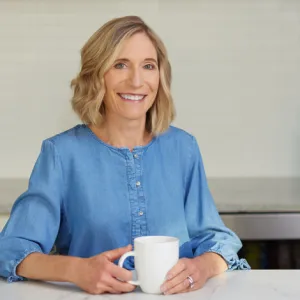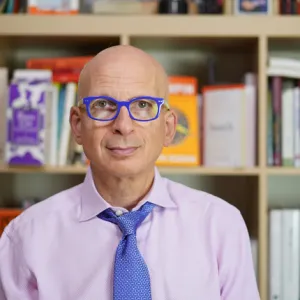
Lee Rankinen
Improving Lives 10 Minutes At A Time
Millions turn to the Optimal Living Daily podcast for advice. Co-founder Lee Rankinen shares lessons from 6,000+ hours of personal development study.
What could you learn if you spent more than 6,000 hours studying personal development? How might you become better at life? In what ways would you change?
Those were the types of questions I wanted to put to Lee Rankinen, the co-founder of the Optimal Living Daily podcast. Lee and co-founder Justin Malik left corporate America several years ago to become purpose-driven podcasters.
They've since produced thousands of episodes covering self-help, relationships, finance, health and anything else they feel will help you lead a more meaningful life. Their shows, which last only about 10 minutes per episode, have been downloaded more than 150 million times.
In this episode you'll hear:
- How minimalism can help you focus on what's important
- The most effective way to change your life for the better
- How self-limiting beliefs sabotage your plans — and how to break the cycle
- The incredible power of starting small
FRANK BLAKE: Welcome to the show, Lee, we're thrilled to have you here.
LEE RANKINEN: Thanks, Frank. I'm excited to be here and talk with you.
FRANK BLAKE: Let's just jump right in with what I mentioned in the introduction. Is that right, you spend roughly half a day reading articles and books?
LEE RANKINEN: You nailed it. It's about four hours a day.
FRANK BLAKE: I'm just curious, how does that work? Do you start in the morning with a cup of coffee or do you have a specific period of time? How do you decide what it is you read? Just take us through, what is happening during the day, how do you structure it, et cetera?
LEE RANKINEN: I'd say about three hours of that is probably set up reading current, ongoing contributing authors we have. We have a list of over 200 authors who have given us permission to use their content on an ongoing basis. Usually it's about one article per month per author is the setup.
Then that fourth hour is spent reviewing new blogs and new authors and new writers that I can find online. Whether that's a recommendation from a current author or just an article I stumble upon or a blog I stumble upon, I spend that time researching new authors and then reaching out to them to get their permission so we can continue to grow that author list.
As far as the timing goes, it totally depends. I got two little ones at home, and since I work out of my house, my schedule changes drastically by the day. Sometimes I'm up at 1:00 in the morning getting up to start the day and I'm reading at that time, and sometimes it's middle of the day, it's at night, it really kind of varies.
But you are right, I have to be in the right mindset to really consume and understand the content. I'm making sure that I'm picking the best stuff for the shows. It's something where I really do have to be focused and paying attention while I'm doing it.
FRANK BLAKE: If I think about what you do, there are two angles where you're really doing good things for other people. The first is most obviously for your audience, you're pulling together this information that hopefully will be helpful for them in their lives.
But secondly, I imagine there are just a lot of people out there who are writing blogs, writing books, giving out thoughts, some of whom are not so well known, and then they get featured on OLD and they become better known.
Take the people who are not famous, but you're going to bring to light, what triggers your interest? How do you decide who gets on the show and who doesn't get on the show?
LEE RANKINEN: It really just comes down to fit of the content, making sure it's a good fit for our audience. Everybody's got a unique voice, so it's amazing to hear different writers attack very similar topics or subjects, even within the realm of personal development, from their own unique vantage point.
I think there's a lot for our listeners to learn just from hearing it from different unique perspectives. Really, I'm just looking for content that fits in the genre and also, just the quality of content. Some of the writers that we have, that maybe have some of those smaller audiences, are just incredible writers.
I come away from reading their stuff and I always am like, "I've never thought about it in that unique light before," and it's really impactful for me. We understand every article is not going to hit a home run with every listener, every time, but if we can catch them 50% of the time, 75% of the time, and they're like, "This episode was totally worth listening to," then I think we're doing something right.
FRANK BLAKE: What are some examples of authors, writers, commentators, whom were not well known that you read and now feature fairly frequently?
LEE RANKINEN: One would be Jay and Heather Harrington. They have a site called Life and Whim. They're based in Michigan as well, quite a few hours from where I'm at, but they cover everything from minimalism to personal development to parenting.
I think just reading their story, it really relates to me personally. I've got a couple of young kids, they have young children, they were working in corporate America, working a lot and took a step back, reevaluated their life and wanted to slow things down and focus on family and what was really important to them.
The writing is fantastic. If you told me that they were bestselling authors, when I read their stuff, I'd totally believe you, because the writing is really that quality. The content really fits my personal situation. For me, it's very impactful. And then another one who just, I believe, launched, I think it's his first book, is Michael Mehlberg. He's more of a business productivity type of writer. He writes incredibly. I compare his stuff to some of the really large writers whose stuff I read and I'm always come away very impressed.
FRANK BLAKE: It's interesting that you mentioned him, because when I was looking at your site and going through all the different possibilities, one of the things that caught my eye was his. I think the title was Destroy Distraction. That's just a great… I got that, yup, that's important. Destroy distraction.
LEE RANKINEN: Exactly.
FRANK BLAKE: You mentioned minimalism, and I see again on your site that that's one of the themes that comes up fairly frequently, but translate that for the Crazy Good Turns audience? What does that mean?
LEE RANKINEN: Minimalism is the mindset of focusing on what's really important. Some people take minimalism as, "I need to own as few things as possible and that's it." But I think if you really get into the message, it's more about focusing your time, your money, your attention on what's really important. If that becomes your focus, everything else just becomes secondary and you can improve your life.
The way I look at it, it's a personal development tool. It's a lifestyle for some, they're totally dedicated to it and they own 30 items and that makes their life better. But for me, it comes down to focusing on what's really, truly important. Relationships, maybe passion projects if you're working on something, even if it is physical items, it's stuff that actually brings value to your life almost each and every day.
FRANK BLAKE: Obviously for this podcast we like to celebrate people who are focused on what we think is the most important thing, or one of the most important things, which is giving back and helping others. Have you seen that in the other folks who are commenting on minimalism or what comes up in terms of how people advise people about optimal living?
LEE RANKINEN: We get so much positive feedback from listeners. Emails weekly where people, certain episodes or certain content, or just the consistency of the content, really help them change their mindset and really help them through either a tough time or a transition period in life.
Minimalism is a great tool. We've had so many emails from people who were really in financial struggles and they were caught in that, trying to keep up with the Jones' mentality with their, "I need a bigger house, I need a nicer car, I need all this stuff."
And then when they hear these perspectives of people who are like, "You don't need that. If that stuff makes you happy and that's what you need to be happy, that's one thing. But if you're looking at yourself and you don't need that stuff, then take a step back and figure out what's really important to you and focus on that."
FRANK BLAKE: With all of this reading and all of the great material, what would you say are some of the most important lessons that you yourself have learned?
LEE RANKINEN: I would say start small and do it daily, whatever it is. If you're trying to improve your life in any way possible, start as small as possible so you can consistently do it daily, and then you can build that momentum over time.
It's just like when people are trying to get in shape. First thing they do is they research everything so they know everything about it, and then they plan out a schedule that's going to take them three hours a day of cooking and working out and doing all this stuff. They do it for two, three days and then they're totally burnt out and they can't do it. Whereas you're much better off, do 10 pushups a day the first day, maybe you can do 11 the next day or the next week. Slowly build up and have it become part of your lifestyle.
I think that's one of the biggest messages we see, and it's across everything, finances, health, relationships. It's just those small, consistent actions day over day over day, all of a sudden it becomes so routine it's just part of who you are.
FRANK BLAKE: Habits are incredibly, incredibly powerful. When you think about other lessons, do you get feedback from your audience on when you yourself are thinking, "What are the most important lessons?" Is that from feedback from the audience, or more, that's your own personal reflection?
LEE RANKINEN: It's probably a combination. Sometimes we'll get feedback from the audience and I'll be like, "Wow, I never thought about that." In all this reading and all this content, somebody will have an aha moment on, maybe it's procrastination, for example.
They're like, "I just never realized I was procrastinating on things because I was scared of X, Y, and Z." I think about that and I look at my own life and I'm like, "I think I probably have a few examples where I've done the exact same thing and I've never thought about it."
I think part of it is personal reflection. And then obviously with a large audience and all the listener feedback we get, other people will say things that will jar something in me where I can definitely see that going on in my own life.
FRANK BLAKE: I've heard you talk about self-limiting beliefs and how you get around self-limiting belief. Go through that a little bit, because I thought that was an interesting comment.
LEE RANKINEN: It's funny, and this is something that I completely learned from consuming all this content, but it's that idea of you limit yourself by saying, "I'm this type of person." "I'm not the type of person that wakes up at 5:00 AM and works out."
Well, can you not become that person, or are you just putting that belief on yourself? My favorite example is, "I'm not the type of person who dances at weddings." Even if you're dying to dance, you want to get out there and have a great time, you're too concerned that maybe you're not a good dancer, maybe people will-
FRANK BLAKE: Are you saying this as a personal reflection?
LEE RANKINEN: I love to dance at weddings and I'm not a very good dancer, my wife will tell you. But I just love that example because I think it's a position everybody's been in at some point in their life, where they really want to do something, they think it would be really fun to do, and they just put themselves in this own box by having some type of self-limiting belief that they're just not that type of person. Even if they really want to be that type of person, they've put a box around themselves that says, "I'm just not, I'm not that type of person, even if I want to be."
FRANK BLAKE: How does someone recognize that they've formed a thin line between this belief that you're not that kind of person and another person might say, "Face into who you are." What's that line that divides those? How do I know I've got a self-limiting belief?
LEE RANKINEN: Well, I think if it's something that you really, truly desire, you really want to do it, you think it would make you happy to do that, to pursue that path, to try this new thing, to get in great shape. Maybe you've never really taken care of yourself from a nutrition, from an exercise standpoint, but you really desire it.
You're looking at yourself and you're picturing yourself a year or five years into the future, and you think you'd be happier with that person, but you continue to live in that old mindset of, "It's just not for me," then I think that's where you can realize that that's a self-limiting belief you have. You're putting yourself in this box, even though you know you'd be much happier, and you're desiring to be this other person.
FRANK BLAKE: How do people break out of that?
LEE RANKINEN: It's hard, but I think it goes back, again, you got to change habits. It's small things, it's consistent things, every day. If you're trying to get in shape, maybe you go for a walk every morning for 10 minutes. Maybe you do a five minute workout. It's little things and you build them up over time.
We all know people like that, that wake up every morning at 5:00 AM and they work out for an hour and it's a part of their day and they eat healthy. If somebody has dessert, maybe they'll have a little piece, but they don't have to eat five pieces of cake or something like that.
It's just become who they are because they've built up so much momentum, that just like that self-limiting belief is, "I don't dance at weddings," this person says, "I'm very healthy. I take my health very seriously. I prioritize my health so I can give as much as possible to the rest of my life because I am in good shape." It almost becomes the self-fulfilling belief of, "I am this person."
FRANK BLAKE: What's your favorite example of a listener who's written or communicated with you saying whatever their version of, "I don't dance at weddings, and now I dance at weddings. Thank you for making that impact on my life"?
LEE RANKINEN: We've had some really powerful stories over the year, and one was from a younger listener who was pregnant. She was in an abusive relationship, grew up in poverty, and just thought this is the way her life was going to be forever.
I don't even remember how exactly she found Optimal Living Daily, but she found it, it gave her a lot of strength. She had her baby, she moved far away, got out of the abusive relationship, cut off ties from people that were trying to drag her back into that type of life, and is now going to school and is really trying to pursue a life that's meaningful to her and a life that's going to be good for her child. Really impactful stuff.
Stuff that you read and you're like, "Wow." It's amazing that this is helping people get to that place, but it's also amazing that they feel open enough to be able to share it with us.
FRANK BLAKE: Is that not part of the fuel that drives you in doing this?
LEE RANKINEN: 100%. Sometimes we'll get those really nice emails and we'll leave them in our inbox for two, three weeks, a month. It's like, if you're having a rough day, just go back and read that email one more time. Read about the impact that these shows are having on people's life. It is, it's an amazing driving force. Especially when we first got started, we were growing at a decent rate, but we weren't making any money at all, we weren't able to finance the operation at all, but getting that listener feedback, we knew we were onto something and we knew we needed to keep going.
FRANK BLAKE: How do you get your feedback from listeners, and does it shape the next topic that you're coming up with or does it shape your mindset if you go through your four hours of reading a day?
LEE RANKINEN: It definitely does. We have a mailing list. We'll direct people from the podcast to our website, get them to sign up, and then one of the first emails they'll get from us is what are you currently struggling with?
We use that question, which we get a ton of listener feedback from, to help shape the content, to make sure we're curating content that's going to be a good fit for people, especially when they're actually expressing what they're looking for.
One thing we did, we actually added a new show at the end of the year, it's called Optimal Living Advice. We have a life coach, Greg, who actually takes some of these listener questions, and not only will he answer it on the show, but he will type up a complete response of his answer to the message and email it to that person directly before it ever even launches on the show. It's hard to scale that, but we're doing it as much as possible. We're actually trying to give proper and helpful feedback to people directly.
FRANK BLAKE: Was there someone in your life who gave you great advice that was important to you that was behind this?
LEE RANKINEN: It's hard to say. I've been around so many great people. Just family members and people I worked with in business, and when I was playing football, football coaches. There's just so many wonderful people I've been around. I don't remember any distinct advice necessarily, but I always remember the way people make you feel.
You can see, with their actions, how other people look at them and how other people can reflect their leadership. I think that's the kind of things that has left the biggest imprint on me, is when you see other people interact with them and you remember how you feel when you interact with those kind of people. You want to take that emotion, and you want other people to feel that way when they interact with you.
FRANK BLAKE: How do you think this appealed to you, with being in effect in the advice business?
LEE RANKINEN: For me, Justin and myself, Justin's my co-founder and the host of Optimal Living Daily, we never thought of ourselves as the actual people you go to for advice. We know we're not the experts. What we want to do is create this channel where we can funnel expert advice to our listeners. We're the middlemen and we're funneling it out.
I'm hoping to expose you to as many unique perspectives and amazing advice, but personal development has always been a passion of mine. Since I was in high school, it was always something, whether it was sports or personal finances or health, I was always trying to look for that edge. I was always reading books and trying to discover new ways of thinking about things and new ways I could improve my life and my relationships.
It's just always been a desire for me. Justin and myself had a mobile application business before we started podcasting, and we were just really burnt out because we weren't bringing anything good to the world. We weren't passionate about anything we were doing. We both really wanted to do something in the personal development space. Justin came up with this idea and we just ran with it. Hit the ground running, and here we are five years later.
FRANK BLAKE: When you say, "Here's my purpose, here's what I'm trying to do," how do you define?
LEE RANKINEN: My purpose right now. It's a really good question. It's not something I think about a lot. My personal life, my purpose is obviously, I want to be the best husband to my wife and best father to my kids as possible.
FRANK BLAKE: That's an awfully good answer.
LEE RANKINEN: That's the thing that drives me more than anything else. It's being around family, it's being around friends, it's being the person that they can count on for whatever, whenever they need it. And then I think if you take that and extend it into our business, that's what we're trying to do for… We're trying to scale that into as many people as possible. We want to be a source of positivity. An area where you feel like you can grow, where you can meet like-minded people, and move forward in a positive way.
FRANK BLAKE: Five years from now, what's Optimal Living Daily doing, and what are you doing as part of it?
LEE RANKINEN: We've slowly grown the team, Optimal Living Advice is a great example of something we just started seven months ago. We have many more ideas. I think we have a list of 100 ideas for new shows. We're trying to-
FRANK BLAKE: Is that right?
LEE RANKINEN: Yeah. We start slow, we're a small team, we want to make sure stuff works, but we're also not afraid to try things. We've tried many shows in the past that we just fired away, tried to get them going and if it hit and it works for an audience, great, if it doesn't, we're onto the next thing.
We have some other areas that we'd really like to work on. We'd like to continue to grow the team, maybe create some more original content. We have a writer that works for us right now and she writes some wonderful content for our own blog and guest posts on other sites. We want to continue to expand what we're doing, but maybe even be able to niche down in a few more areas to help more people.
FRANK BLAKE: That's terrific. Great. If there's one thing that you want to tell the Crazy Good Turns audience, either about your podcast or what you've learned generally, what would it be?
LEE RANKINEN: I would say, I don't want to go back to it too many times, but it's that start small piece. Nothing is too big. People vastly overestimate what they can do in one year, and they vastly underestimate what they can do in three years.
If you want to do something and you think it's too big, just start small and do it. If it's really important to you, just start very small and you'll be amazed at how much growth you can encounter, especially if you're able to give yourself a long enough time horizon. If you're talking about three years, it's amazing what you could change or improve or add to your life in that period of time.
FRANK BLAKE: That's great advice, Lee. One of the great pieces of business advice that's similar to that, as Bill Gates very famously said, "The world changes less in two years than you might anticipate, but much, much more in five." That was true of adoption of digital formats and all the rest.
Don't expect the world to change overnight, but those small steps have an amazing cumulative impact. I'm sure Optimal Living Daily has that same sort of impact. Thank you for what you're doing there, that's really exciting and great. Just lay out for the audience, if they want to connect more, learn more about it, what should they do?
LEE RANKINEN: You can find Optimal Living Daily and any of our podcasts in any podcast player, Spotify, anywhere you listen to podcasts. You can connect with us directly at oldpodcast.com. You can find out everything, you can email us. Everything you need to find out about us, you can find there.
FRANK BLAKE: All right. Terrific. Thank you very much. It's been a real treat talking to you.
LEE RANKINEN: Thank you. I appreciate it.




